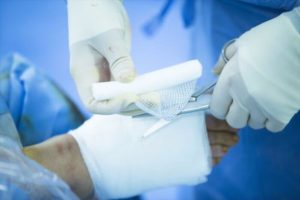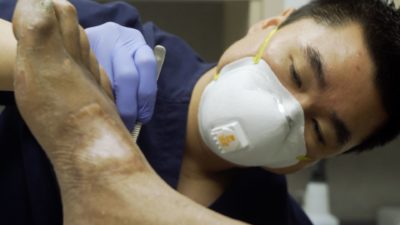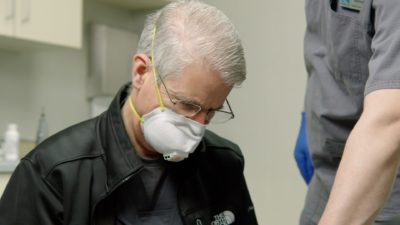What is a skin graft?
 Skin grafts and tissue replacement can be used to treat foot ulcers in people with diabetes by reconstructing the skin defect. Skin substitutes need to be placed on a prepared wound bed to ensure contact between the wound bed and the graft and they take on the functions of the missing skin layer. Furthermore, diabetic foot wounds are a serious issue that needs immediate treatment. Many diabetics walk around with wounds on their feet that are not getting properly treated. A highly trained Family Foot & Ankle Physician can evaluate and treat these wounds. After making sure there are no underlying issues that are contributing to the wound, we will advise you on how to treat your diabetic foot wound.
Skin grafts and tissue replacement can be used to treat foot ulcers in people with diabetes by reconstructing the skin defect. Skin substitutes need to be placed on a prepared wound bed to ensure contact between the wound bed and the graft and they take on the functions of the missing skin layer. Furthermore, diabetic foot wounds are a serious issue that needs immediate treatment. Many diabetics walk around with wounds on their feet that are not getting properly treated. A highly trained Family Foot & Ankle Physician can evaluate and treat these wounds. After making sure there are no underlying issues that are contributing to the wound, we will advise you on how to treat your diabetic foot wound.

The topic of skin grafting will come up as a treatment for diabetic foot ulcers when other means have been exhausted or you are past the point of more conservative treatments.
Typically, larger wounds require a skin graft, which is successful in covering skin defects and allows your wound to heal more effectively. If you have questions about skin grafts and our process, please contact Family Foot & Ankle Physicians to review your conditions and discuss skin graft treatment options.
Today there are advanced skin harvesting processes that require no trip to the operating room. Most skin grafts can take as quick as 7 days and results are very promising. For example, patients that have had a wound for 4 months, can see their wound healed within a week of applying a skin graft. Advanced treatments such as these are common practice for Family Foot & Ankle Physicians doctors, and we are confident this procedure can help you if we determine this is the best course in your care plan.

Not every wound responds to every treatment, and not all wounds are alike. The challenge wound care physicians face is using an appropriate graft in the correct situation. Venous wounds, arterial wounds, traumatic wounds, etc. will respond differently to treatments. Only a skilled, experienced podiatrist, who deals with large quantities of wounds on a regular basis, can tell you which one of the grafts may be right for your wound. Due to the high costs of these products, this is critical, because applying the wrong product may actually make the wound worse, delaying healing, increasing the risk of infection or amputation.
If you or a loved one has a wound of the foot, ankle or lower leg call us today to see if you are a candidate for this procedure.
If you have questions about your wound, or if you need treatment for a chronic wound, call our professional podiatrists, and we will do everything we can to prevent complications, reduce amputation risk, and help treat the wound.
How long does it take for a skin graft to heal on foot?
This varies from person to person. It depends on the size of the wound and skin graft needed to completely heal the site.. The skin graft heals wounds 40-50% faster than the wound can heal on its own.
Below is a list of skin grafts used at Family Foot & Ankle Physicians:
- Revita
- Epifix
- Grafix
- Affinity – Nushield – Puraply
- Tides Artacent
- Red Dress
- Apligraf
- Dermagraft
- Flower
- Dermavest
These skin grafts are the most popular on the market today. Our physicians will match you with the right donor graft for your wound and we will work with you weekly until the skin graft has completely worked for you.
Why trust us to care for your wound?
- Many patients with lower-extremity chronic wounds are unable to change their own dressings.
- Patients with chronic wounds fear touching their own wounds and prefer that their physician or nurse exclusively control their wound care.
- When treatments do force patients to change their own primary wound dressings, wounds can be exposed to bacteria in the home that can lead to contamination of the wound.
Family Foot & Ankle Physicians has a primary location in Greenville, servicing cities such as Greenville, Farmville, Ahoskie, Kinston, Winterville, Tarboro, New Bern, Edenton, Washington, Rocky Mount, with patients coming throughout eastern North Carolina and beyond. To request your appointment, call our Greenville office today, talk to your doctor about a referral or use the online booking tool to schedule your visit.
